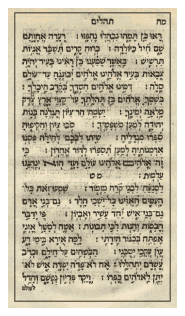
If these words are important,
why let others tell you what they say?
|

What you are about to do is to set aside every Biblical translation attempt
you knew before and return to the first markings ever inscribed. This
is the genuine message, in the words spoken at that time.
Using these written words we can go back to the days when there was no TV or radio -
not even newspapers. Written over 500 years before Jesus, just
 finding someone then who could both read and write was difficult. But when you
contemplate the foundational originality of these words, they truly do
reveal the way they viewed their surroundings, their lives, and precisely what
was important to them.
finding someone then who could both read and write was difficult. But when you
contemplate the foundational originality of these words, they truly do
reveal the way they viewed their surroundings, their lives, and precisely what
was important to them.
However surprising as it may be, it is not the words or the language
that is the difficult part of this journey. The new
Root Character method will make these words so amazingly easy to comprehend,
you'll wonder why this isn't common knowledge.
No, the hard part is letting go of our own modern thoughts and labels,
to see their world through their eyes.
As an exploration of humanity in that day, there is one common element within
us which we simply must escape to get the most from the 'root character' method.
 Consider for a moment how familiar it is to hear someone claim those in
London or Australia drive on the "wrong" side of the road. Obviously,
they drive correctly on the "other" side, but our human tendency is to always
assume - our way is the correct one. In the realm of Bible studies, this
impulse of "mine is correct" is also revealed in the way the "proper"
adaptation amongst the hundreds of translations is always - "ours" or "mine".
Today however, you are going to eliminate the need for any such, possibly flawed or
biased translation - and return to the original. These scratchings are the words
which every single translation came from.
Consider for a moment how familiar it is to hear someone claim those in
London or Australia drive on the "wrong" side of the road. Obviously,
they drive correctly on the "other" side, but our human tendency is to always
assume - our way is the correct one. In the realm of Bible studies, this
impulse of "mine is correct" is also revealed in the way the "proper"
adaptation amongst the hundreds of translations is always - "ours" or "mine".
Today however, you are going to eliminate the need for any such, possibly flawed or
biased translation - and return to the original. These scratchings are the words
which every single translation came from.
Unfortunately, this tendency toward strongly believing our own definitions are the
correct ones, gets even worse when we translate our words to and from other
languages. Too often, people assume that for every foreign word, there
is an exact match in English. Words such as "ketchup" or foreign names
such as "Osama" are assumed to have a correct spelling. While
not nearly as important for our project, this conceit also surrounds word pronunciation
and the proper way y'all 'say' many words.
Pronunciation is our first hint this journey is going to be easier than
you thought. While it is certainly interesting how to pronounce Hebrew
words, it is not necessary when attempting to understand them. Pronunciation
 is so unnecessary, in these original words? - There are no vowels.
Vowels were not added to Hebrew writing until over a thousand years later.
They came in the form of dashes and dots you can see added to the Hebrew phrase shown here.
is so unnecessary, in these original words? - There are no vowels.
Vowels were not added to Hebrew writing until over a thousand years later.
They came in the form of dashes and dots you can see added to the Hebrew phrase shown here.
Consider now how important these original words are - and what we've done to
them. We began with an early language of extreme simplicity
containing no vowels, and no upper/lower case, and also no
 punctuation to concern ourselves with.
We've then attempted to somehow force these beautifully uncomplicated terms
into our English words - easily one of the most
fluid and complicated of languages ever created in history. Our English dictionary
exhibits a dozen or more synonyms for nearly every single word.
Today's English is a literal smorgasbord of languages from all over the
world and the rules of its dialect vary as often as the 'C's in the
word 'circus'. Even
comparing it to British, you'll find spelling differences such as the word 'colour'
- as well as differences in many word definitions.
Those definitions also change today in an extremely short period of time.
Just look at what happened to the words 'cool ', 'cute', and 'bad ' in the
last few decades. Meanwhile, how many of you have recently added the hispanic word
'chalupa' to your vocabulary as well as other new terms and abbreviations?
punctuation to concern ourselves with.
We've then attempted to somehow force these beautifully uncomplicated terms
into our English words - easily one of the most
fluid and complicated of languages ever created in history. Our English dictionary
exhibits a dozen or more synonyms for nearly every single word.
Today's English is a literal smorgasbord of languages from all over the
world and the rules of its dialect vary as often as the 'C's in the
word 'circus'. Even
comparing it to British, you'll find spelling differences such as the word 'colour'
- as well as differences in many word definitions.
Those definitions also change today in an extremely short period of time.
Just look at what happened to the words 'cool ', 'cute', and 'bad ' in the
last few decades. Meanwhile, how many of you have recently added the hispanic word
'chalupa' to your vocabulary as well as other new terms and abbreviations?
You may now be asking, 'How will this translation be any different?'
The answer is the new Root Character method - our dictionary of their world.
Coming next, we will begin with the fascinating origins of
language itself - including our own English alphabet.
We hope even those not particularly interested in the Bible
will find these pages both educational and entertaining.
 But to truly understand these wonderful words from the
past, you must put yourself in their shoes. For example, consider the
story of Jonah. Many times it is represented as 'Jonah and
the Whale' as this a normal translation version. However,
in the original Hebrew, 'whales' were unknown as no one had any idea
whales and dolphins were mammals and quite different from the others.
To this day, some people are shocked to discover whale as well as dolphin babies suckle milk
from their mother's breast, underwater. So, if you are not going to convey
awareness in the writers that simply wasn't there, the correct
translation was actually just a very big fish. This level
of simplicity is the reality of the words -
their very thoughts - for that time period.
Anything else is added content and wrong to imply.
But to truly understand these wonderful words from the
past, you must put yourself in their shoes. For example, consider the
story of Jonah. Many times it is represented as 'Jonah and
the Whale' as this a normal translation version. However,
in the original Hebrew, 'whales' were unknown as no one had any idea
whales and dolphins were mammals and quite different from the others.
To this day, some people are shocked to discover whale as well as dolphin babies suckle milk
from their mother's breast, underwater. So, if you are not going to convey
awareness in the writers that simply wasn't there, the correct
translation was actually just a very big fish. This level
of simplicity is the reality of the words -
their very thoughts - for that time period.
Anything else is added content and wrong to imply.
Unfortunately, even a word with a singular meaning can be difficult to pin down
at times when we relate to it using our own modern world concepts
- even with the Root Character assistance. Fortunately, there is also
a wonderful consistency to these ancient words that make understanding them even easier.
In other words - many times when it's unclear what the writer meant with a
particular term, their use of the same word a few paragraphs later can clarify things
tremendously.


It does not matter if you are Amish - or atheist - these
ancient Hebrew words are important in our lives.
|
|